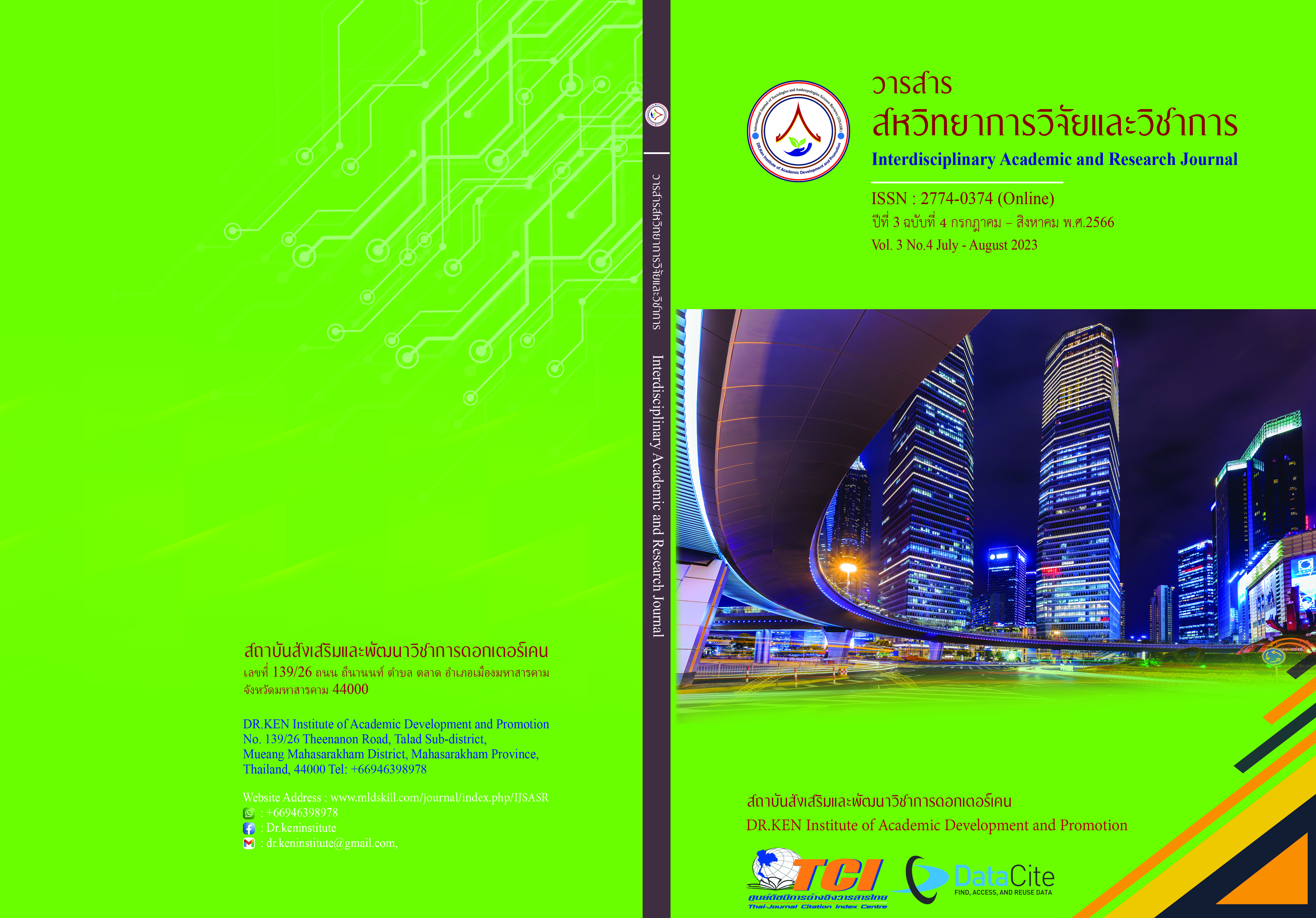The Development of Programs to Enhance Creative Leadership Among School Administrators under the Surin Secondary Educational Service Area Office
DOI:
https://doi.org/10.14456/iarj.2023.216Keywords:
Vision; , Flexibility; , ImaginationAbstract
Creative leadership is developed based on the belief that in a school there may be several leaders who perform a wide range of leadership roles. Leadership roles are therefore not limited to executives only; however, the duty of administrators is to create learning opportunities for teachers and personnel as a channel for such individuals to develop themselves into creative leaders. This research aims to; 1) study current conditions, desirable conditions, and the requirements for enhancing the creative leadership of school administrators and 2) develop a program that will enhance the creative leadership of school administrators. The program consists of three modules, which are 1) the vision module, 2) the flexibility module, and 3) the imagination module. The samples for this study consisted of 300, including school administrators, vice-administrators, and heads of departments. The research instruments were questionnaires, semi-structured interview forms, and evaluation forms as data collection instruments. The collected data were analyzed using measures such as mean, standard deviation, and priority needs index. The findings of the study revealed the following: (1) The current level of creative leadership among school administrators was assessed to be at a medium level overall. On the other hand, the desirable conditions for creative leadership among school administrators were rated at the highest level. The priority needs index that the areas requiring the most attention, ranked from highest to lowest, were vision, flexibility, and imagination. And (2) The program designed to enhance creative leadership among school administrators, as implemented by the Surin Secondary Educational Service Area Office, was evaluated as highly appropriate overall. The possibility for the program was also assessed to be at the highest level.
References
ทวีศักดิ์ จินดานุรักษ์. (2560). ความเป็นผู้นำทางการศึกษา. พิมพ์ครั้งที่ 2. กรุงเทพฯ: จุฬาลงกรณ์มหาวิทยาลัย.
ธำรง บัวศรี. (2542). ทฤษฎีหลักสูตร การออกแบบและการพัฒนา. พิมพ์ครั้งที่ 2. กรุงเทพฯ: ธนธัชการพิมพ์.
บุญชม ศรีสะอาด. (2556). การวิจัยเบื้องต้น. กรุงเทพฯ. สุวีริยาสาส์น.
บุณรดา ทรงบุญศาสตร์. (2559). การพัฒนาโปรแกรมเสริมสร้างภาวะผู้นำเชิงสร้างสรรค์ของผู้บริหารสถานศึกษาสังกัดสำนักงานเขตพื้นที่การศึกษามัธยมศึกษา เขต 24. วิทยานิพนธ์ปริญญาการศึกษามหาบัณฑิต สาขาวิชาการบริหารและพัฒนาการศึกษา คณะศึกษาศาสตร์ มหาวิทยาลัยมหาสารคาม.
พชรวิทย์ จันทร์ศิริสิร. (2560). นโยบายและการวางแผนกลยุทธ์สำหรับสถานศึกษายุคใหม่. มหาสารคาม: อภิชาติการพิมพ์.
พัชรา วาณิชวศิล. (2560). การพัฒนาภาวะผู้นำ : จากทฤษฎีสู่แนวปฏิบัติที่ดีและกรณีศึกษา. กรุงเทพฯ : ปัญญาชน.
พิมพ์พร พิมพ์เกาะ. (2557). การพัฒนาโปรแกรมเสริมสร้างภาวะผู้นำเชิงสร้างสรรค์ของผู้บริหารโรงเรียนสังกัดองค์กรปกครองส่วนท้องถิ่น. วิทยานิพนธ์ปริญญาการศึกษาดุษฎีบัณฑิต สาขาวิชาการบริหารและพัฒนาการศึกษา คณะศึกษาศาสตร์ มหาวิทยาลัยมหาสารคาม.
ไพฑูรย์ สินลารัตน์. (2553). ผู้นำเชิงสร้างสรรค์ : กระบวนทัศน์ใหม่และผู้นำใหม่ทางการศึกษา. กรุงเทพฯ: จุฬาลงกรณ์มหาวิทยาลัย.
วัฒนา ปะกิคา. (2560). การพัฒนาโปรแกรมเสริมสร้างภาวะผู้นำเชิงสร้างสรรค์ของผู้บริหารโรงเรียน. วิทยานิพนธ์ปริญญาการศึกษาดุษฎีบัณฑิต สาขาวิชาการบริหารและพัฒนา การศึกษาคณะศึกษาศาสตร์ มหาวิทยาลัยมหาสารคาม.
วิโรจน์ สารรัตนะ. (2551). การประยุกต์ใช้ Log Frame เพื่อออกแบบโปรแกรมพัฒนาวิชาชีพบุคลากรทางการศึกษา สู่กรอบแนวคิดเพื่อการวิจัยและพัฒนา. วารสารบริหารการศึกษา มหาวิทยาลัยขอนแก่น, 4(1), 3-18.
สมคิด บางโม. (2554). เทคนิคการฝึกอบรมและการประชุม. พิมพ์ครั้งที่ 3. กรุงเทพฯ : วิทยพัฒน์.
สังคม กุลสุวรรณ. (2557). พฤติกรรมผู้นำมืออาชีพตามความคิดเห็นของผู้บริหารและครู สังกัดสำนักงานเขตพื้นที่การศึกษามัธยมศึกษา เขต 29. วิทยานิพนธ์ครุศาสตรมหาบัณฑิต สาขาวิชาการบริหารการศึกษา มหาวิทยาลัยราชภัฏอุบลราชธานี.
สุเทพ พงศศรีวัฒน์. (2548). ภาวะผู้นำ ทฤษฎีและปฏิบัติ ศาสตร์และศิลป์สู่ความเป็นผู้นำที่สมบูรณ์. พิมพ์ครั้งที่ 2. เชียงราย : มหาวิทยาลัยราชภัฏเชียงราย.
สุธีระ ประเสริฐสรรพ์. (2559). ผลึกความรู้ชุดงานวิจัยฉบับเคี้ยวง่าย Re-Learning จากเรียนรู้สู่เรียนคิด. กรุงเทพฯ : ภาพพิมพ์.
สุมิตรา พงศธร. (2550). สรุปเรื่องของหลักสูตร. สภาการศึกษาคาทอลิกแห่งประเทศไทย. 2(79), 15-23.
อรชร กิตติชนม์ธวัช. (2558). การพัฒนารูปแบบการบริหารโรงเรียนเพื่อเสริมสร้างภาวะผู้นำเชิงสร้างสรรค์ของนักเรียนประถมศึกษา. วิทยานิพนธ์ปริญญาครุศาสตรดุษฎีบัณฑิต สาขาวิชาบริหารการศึกษา คณะครุศาสตร์ จุฬาลงกรณ์มหาวิทยาลัย.
อุ่นตา นพคุณ. (2548). กรอบแนวคิดการพัฒนาอย่างมีส่วนร่วมทางการศึกษานอกระบบโรงเรียน. กรุงเทพฯ : ชวนพิมพ์.
Ash, Ruth C., & Persall, M., (2007). The Principle as Chief Learning Officer: The New Work of Formative Leadership. Birmingham: Stamford University Birmingham.
Basadur, M. (2008). Leading Others to Think Innovatively Together: Creative Leadership. Journal of The Leadership Quarterly, 15(1), 103-210.
Caffarella, R. (2002). “Planning: Programs for Adult Learners: A Practical Guide for Educations” Trainers and Staff Developers. San Francisco : Jossey-Bass.
Carolyn, B., & et al. (2013). How to Develop a Training Program on the Job. Retrieved on 16 June 2021 from: http://www.wikihow.com/Develop-a-TrainingProgram-on-the-Jop/.
Fink, A.G. (2015). Evaluation Fundamentals: Insights into Program Effectiveness, Quality, and Value. 3rd edition. California: SAGE.
Funnell, S.C., & Rogers, P.J. (2011). Purposeful Program Theory: Effective Use of Theories of Change and Logic Models. San Francisco : Jossey-Bass.
Knowles, M. D. (1980). The Modem Practice of Adult Education from Pedaeow to Andragogy. New York: The Adult Education Company.
Krejcie, R. V. & Morgan, D. W. (1970). Determining sample size for research activities. Educational and Psychological Measurement, 30 (3), 607-610.
Lombardo, M. M., & Eichinger, R. W. (1996). The Career Architect Development Planner. Minneapolis: Lominger.
McDavid, J.C., Huse, I., & Hawthorn, L.R.L. (2013). Program Evaluation and Performance Measurement: an Introduction to Practice. 2nd edition. California: SAGE.
Zhang, Q., (2016). Creative Leadership Strategies for Primary School Principals/Teachers Creativity/Guangxi, China. Ph.D. Thesis, Educational Administration, Chulalongkorn University.
Styles, M. H. (1990). Effective Models of Systematic Program Planning. San Francisco: Jossey-Bass.
Downloads
Published
How to Cite
Issue
Section
License
Copyright (c) 2023 Nattipong Fongnual, Surachet Noirid

This work is licensed under a Creative Commons Attribution-NonCommercial-NoDerivatives 4.0 International License.
Copyright on any article in the Interdisciplinary Academic and Research Journal is retained by the author(s) under the under the Creative Commons Attribution-NonCommercial-NoDerivatives 4.0 International License. Permission to use text, content, images, etc. of publication. Any user to read, download, copy, distribute, print, search, or link to the full texts of articles, crawl them for indexing, pass them as data to software, or use them for any other lawful purpose. But do not use it for commercial use or with the intent to benefit any business.
















.png)


